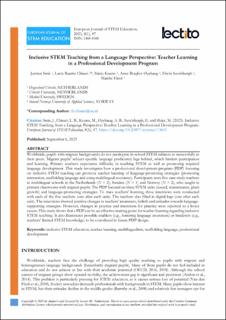| dc.contributor.author | Smit, Jantien | |
| dc.contributor.author | Chisari, Lucia Beatriz | |
| dc.contributor.author | Kouns, Maria | |
| dc.contributor.author | Øyehaug, Anne Bergliot | |
| dc.contributor.author | Savelsbergh, Elwin | |
| dc.contributor.author | Hajer, Maaike | |
| dc.date.accessioned | 2024-02-23T11:55:07Z | |
| dc.date.available | 2024-02-23T11:55:07Z | |
| dc.date.created | 2023-10-03T18:29:17Z | |
| dc.date.issued | 2023 | |
| dc.identifier.citation | European Journal of STEM Education. 2023, 8 (1), 1-15. | |
| dc.identifier.issn | 2468-4368 | |
| dc.identifier.uri | https://hdl.handle.net/11250/3119630 | |
| dc.description | This is an open access article distributed under the Creative Commons Attribution License CC BY 4.0 which permits unrestricted use, distribution, and reproduction in any medium, provided the original work is properly cited. | |
| dc.description.abstract | Worldwide, pupils with migrant backgrounds do not participate in school STEM subjects as successfully as their peers. Migrant pupils’ subject-specific language proficiency lags behind, which hinders participation and learning. Primary teachers experience difficulty in teaching STEM as well as promoting required language development. This study investigates how a professional development program (PDP) focusing on inclusive STEM teaching can promote teacher learning of language-promoting strategies (promoting interaction, scaffolding language and using multilingual resources). Participants were five case study teachers in multilingual schools in the Netherlands (N = 2), Sweden (N = 1) and Norway (N = 2), who taught in primary classrooms with migrant pupils. The PDP focused on three STEM units (sound, maintenance, plant growth) and language-promoting strategies. To trace teachers’ learning, three interviews were conducted with each of the five teachers (one after each unit). The teachers also filled in digital logs (one after each unit). The interviews showed positive changes in teachers’ awareness, beliefs and attitudes towards language-supporting strategies. However, changes in practice and intentions for practice were reported to a lesser extent. This study shows that a PDP can be an effective starting point for teacher learning regarding inclusive STEM teaching. It also illuminates possible enablers (e.g., fostering language awareness) or hinderers (e.g., teachers’ limited STEM knowledge) to be considered in future PDP design. | |
| dc.description.abstract | Inclusive STEM Teaching from a Language Perspective: Teacher Learning in a Professional Development Program | |
| dc.language.iso | eng | |
| dc.rights | CC BY 4.0 | |
| dc.rights.uri | http://creativecommons.org/licenses/by/4.0/deed.no | |
| dc.title | Inclusive STEM Teaching from a Language Perspective: Teacher Learning in a Professional Development Program | |
| dc.title.alternative | Inclusive STEM Teaching from a Language Perspective: Teacher Learning in a Professional Development Program | |
| dc.type | Peer reviewed | |
| dc.type | Journal article | |
| dc.description.version | publishedVersion | |
| dc.source.pagenumber | 1-15 | |
| dc.source.volume | 8 | |
| dc.source.journal | European Journal of STEM Education | |
| dc.source.issue | 1 | |
| dc.identifier.doi | 10.20897/ejsteme/13643 | |
| dc.identifier.cristin | 2181454 | |
| cristin.ispublished | true | |
| cristin.fulltext | original | |
| cristin.qualitycode | 1 | |

